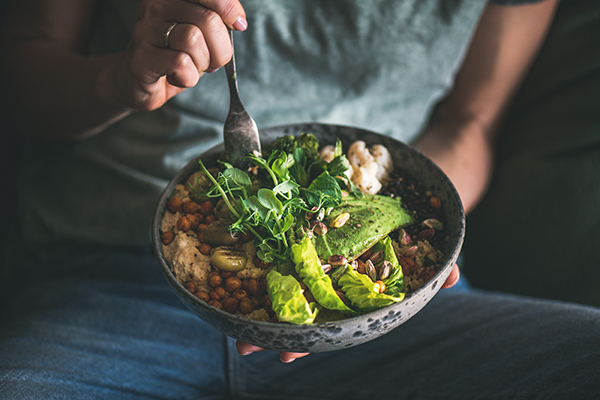Learn more about the nutrition guidelines during peri-menopause and menopause, including information on osteoporosis prevention and management.
Nutrition needs vary between men and women, and across the lifespan. Dietitians are trained to help women in many nutrition-related areas, such as in pregnancy or sports nutrition.

Perimenopause and Menopause
Menopause is linked to changes in metabolism, reduced bone density, and increased risk of heart disease. Therefore, it becomes increasingly important to choose a diet rich in nutrients but lower in caloric density. Think healthy fats, lean sources of protein, low-fat dairy or dairy alternatives, and plenty of fruits and vegetables. Also, physical activity plays a critical in supporting metabolism, maintaining muscle mass, and maintaining bone health. Below are some general guidelines:
- Choose a diet that is nutrient dense, but lower in caloric density. This includes emphasis on vegetables, fruits, legumes, nuts, seeds, whole grains, lean protein, and good food sources of calcium.
- Ensure adequate protein at each meal to maintain lean muscle mass.
- Ensure appropriate portion and type of carbohydrates (low-glycemic, complex carbs such as whole grains, legumes, fruits, vegetables, nuts and seeds.)
- Ensure adequate nutrition for bone health. This includes ensuring adequate calcium (1200mg/day), Vitamin D (2000IU/day), and protein. Note: Prior to menopause, calcium requirements are 1000mg/Day.
- Iron: After menstruation stops, iron needs also decrease from 18 mg/day to 8 mg/day.
- Folic Acid: The recommendation of 400 mcg/day is no longer of immediate importance as this is primarily to prevent neural tube defects in the developing fetus.
- Activity: Reduce sedentary behaviors. Studies suggest that 60min of activity per day can maintain body weight, the same amount recommended by the Institute of Medicine.
- Exercise: Include some form of cardio and resistance exercise to assist in your metabolism, maintain muscle mass, and support bone health
- Sleep Quality: Many women going through menopause experience hot flashes during day and night which is caused by the decline of estrogen and progesterone. This can impact the quality of sleep and overall quality of life. Lack of sleep can also alter our hunger and satiety hormones altering food choices and lead to unwanted weight gain. To help mitigate sleep disturbances, aim to abstain from caffeinated and alcoholic beverages 6 hours prior to sleeping.
Digestive Symptoms
Many women during and after menopause experience changes in their digestion, such as an increase in bloating, bowel discomfort, abdominal pain, and altered bowel patterns. This is thought also to be mediated by hormonal changes, as well as changes in your gut bacteria(your microbiome). Your gastrointestinal system, immune system, blood sugar levels, energy levels and overall health will benefit greatly from following the guidelines below:
- Focus your diet on homemade foods as much as possible.
- Eat foods rich in prebiotics and probiotics to help support your healthy gut bacteria.
- Eat regular, energy-and nutrient-balanced meals (e.g. three meals plus one or two snacks) each day – include protein and complex carbohydrates.
- Drink 2-3L of water each day.
- Ensure adequate sleep, aiming for 7-9hrs per day.
- Practice ‘meal hygiene’ – discrete, intentional meals. Limit mindless grazing as much as possible.
- Avoid ‘good day’ and ‘bad day’ mentality. This can lead to endocrine imbalances and provide incentives to binge on the ‘bad days’. Rather, focus on enjoying small amounts of the foods you love every day.
- Initiate with a regular de-stressing activity at least once per week. Mindfulness Based Stress Reduction (MBSR) is a technique that can lower salivary cortisol and physiologic response to stress.
Osteoporosis Prevention & Management
Osteoporosis is a degenerative bone disease predominantly affecting women. After the age of about 35, your bone density slowly starts to decrease. Ensuring adequate nutrition, in addition to resistance exercise can slow this process down.

Key nutrients that work together to support bone health include calcium, vitamin D, magnesium, and protein.
Calcium intake of 1200mg per day is recommended primarily from food sources, which include: dairy, plant-based milks, dark leafy green vegetables, almonds, tofu, legumes, and canned salmon with bones. Interestingly, some mineral waters contain small amounts of calcium.
Vitamin D recommendations are 2000IU per day, and are very rare in the food supply. We can get Vitamin D from the sun, but during the winter months this is not possible in Calgary due to our latitude. Please take a daily supplement.
The recommended amount of Magnesium is 320mg per day. Great food sources include green leafy vegetables (Ex. Spinach), legumes, nuts, seeds, and whole grains.
Another bone-health relevant nutrient that has been gaining recent attention is Vitamin K2. This vitamin is not to be confused with Vitamin K1, and can be tricky to get in the diet, particularly if you are vegan or do not eat many fermented foods. Some vitamin D supplements have Vitamin K2 added, or you can enjoy it from the following food sources: Egg yolks, sauerkraut, natto (fermented soybean), chicken, cheese, butter, and beef liver. Note that while cheese and butter are great sources of K2, they are also high in saturated fat. Just another reason to practice balance, variety, and moderation!
Hope this information has been useful! Keep those bones healthy and strong! If you have any questions about nutrition in menopause or other areas of women’s health, please reach out and book an appointment with me. I am always happy to help inform and identify strategies to improve your health through nutrition!
Dan Neuman
Registered Dietitian
